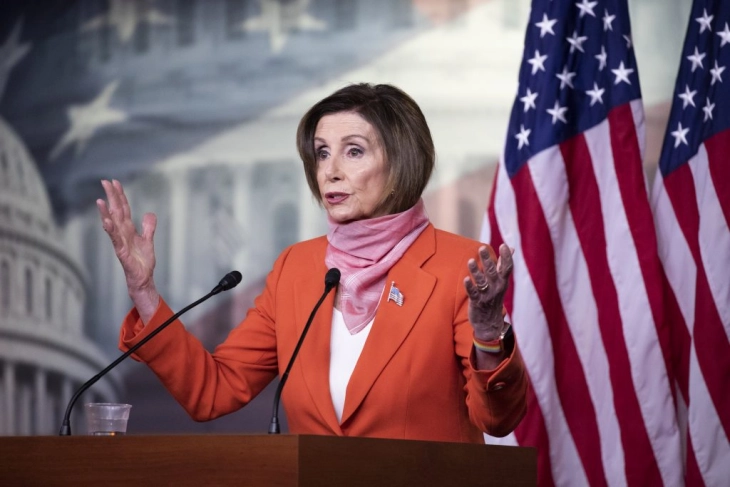Pelosi to step down as House Democratic leader

Washington, 17 November 2022 (dpa/MIA) - After months of speculation about her future, House Speaker Nancy Pelosi said Thursday she will not seek to lead House Democrats for another term, but stay in Congress.
The decision came after her party’s narrow loss of the chamber in last week’s midterm election.
Pelosi, of California, is also abiding by a 2018 agreement with fellow Democrats that she would step down from leadership by the end of 2022 to make way for a new generation.
Pelosi, whose career spans 35 years and who is the nation’s first and only female House speaker, stepped down despite the strong urging of many of her colleagues.
Under Pelosi’s stewardship this year, House Democrats defied expectations that the party would suffer steep losses in the midterm. Instead Republicans gained only a slim majority of the House.
Had Pelosi wanted to remain as House minority leader, she likely could have, despite the 2018 agreement.
Though many Democrats had once voiced a desire for Pelosi, 82, to hand over the reins to a younger generation of lawmakers, her recent success in combating the Trump administration and then aiding the Biden administration won over many of her critics.
Pelosi also said last month’s attack on her husband, Paul, would be a factor in her decision. The speaker’s husband was assaulted with a hammer by an intruder who broke into their San Francisco home aiming to hurt her, police said. She was in Washington at the time. He’s expected to face a long recovery.
She told CNN’s Dana Bash in a Sunday interview that her decision would be rooted in “the wishes of my family and the wishes of my caucus.”
Pelosi said she will remain in Congress, representing her San Francisco district. Democrats said her expertise and fundraising skills will continue to prove helpful, even if she is no longer in a leadership position.
The race to replace Pelosi has occurred quietly behind the scenes for months, but is expected to quickly erupt publicly. Time is now short for House Democrats to coalesce behind her successor.
“Whoever replaces her — and we have some great people who could step up to the plate — they’re going to have to start working out immediately so they’ll have the muscle and the energy to do what she’s done almost effortlessly,” said Rep. Emanuel Cleaver II, D-Mo.
“I’m not happy about it,” he said of Pelosi’s stepping down. “But like me, I think everyone — the speaker included — recognizes at some point we have a limited lifetime. And I think you give all you can and then you try to live out the rest of your life as conflict-free as you can, and nobody can blame her for leaving.”
Rep. Hakeem Jeffries of New York is favored to become the next Democratic leader, though Pelosi’s top lieutenant, House Majority Leader Steny H. Hoyer of Maryland, also has interest in succeeding her.
Rep. Adam B. Schiff of California reportedly had interest in becoming the top Democrat as well, but has decided to focus instead on a potential Senate campaign. California Sen. Dianne Feinstein’s seat is up in the 2024 cycle, though she hasn’t said whether she’ll retire at the end of her term.
“It’s going to be very hard to replace her, to have that kind of leadership,” said retiring Rep. Alan Lowenthal, D-Calif., who called Pelosi “probably the most outspoken and powerful woman in United States politics.”
The speaker’s gavel is likely to go next to House Republican leader Kevin McCarthy of California, the front-runner to lead the chamber next year.
Pelosi has been called one of the most effective House speakers in history. She served as speaker under the past four U.S. presidents.
She muscled through the largest health care reform in generations, the 2010 Affordable Care Act; impeached President Donald Trump twice; kept her caucus united to pass massive multitrillion-dollar legislation to stabilize the economy during the COVID-19 pandemic; and helped push through last year’s $1 trillion infrastructure package.
Born into a prominent Baltimore political family, Pelosi began her career as an elected official in 1987.
Pelosi was known in her early years in Congress as a fierce advocate for a strong government response to HIV/AIDS, a topic that at the time was either taboo or ignored, but was exceedingly important to gay constituents back home in San Francisco.
She was elected to leadership in 2001, beating out Hoyer of Maryland to become minority whip. He remains her second in command. In 2003, she became minority leader, the highest-ranking position among House Democrats when they don’t hold a majority.
After Democrats took control of the chamber in 2006, Pelosi was selected as the first female speaker of the House in January 2007.
Republicans have long seized on Pelosi’s prominence, flooding the airwaves for years with hundreds of millions of dollars’ worth of attack ads deriding her as a “San Francisco liberal” and threatening that Democratic candidates would support her progressive politics.
In her San Francisco-based district, Pelosi consistently won reelection by large margins. She is one of the Democratic Party’s most prodigious fundraisers, raising more than $1 billion for Democrats since entering leadership in 2002.
Pelosi’s ability to get under Republicans’ skin was never more apparent than during the four years of the Trump administration. She gained a new generation of fans for her ability to rattle Trump.
Pelosi made history when she presided over the 2019 and 2021 impeachments of Trump, becoming the first speaker to preside over two impeachments.







